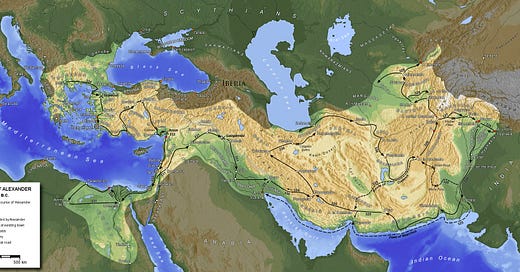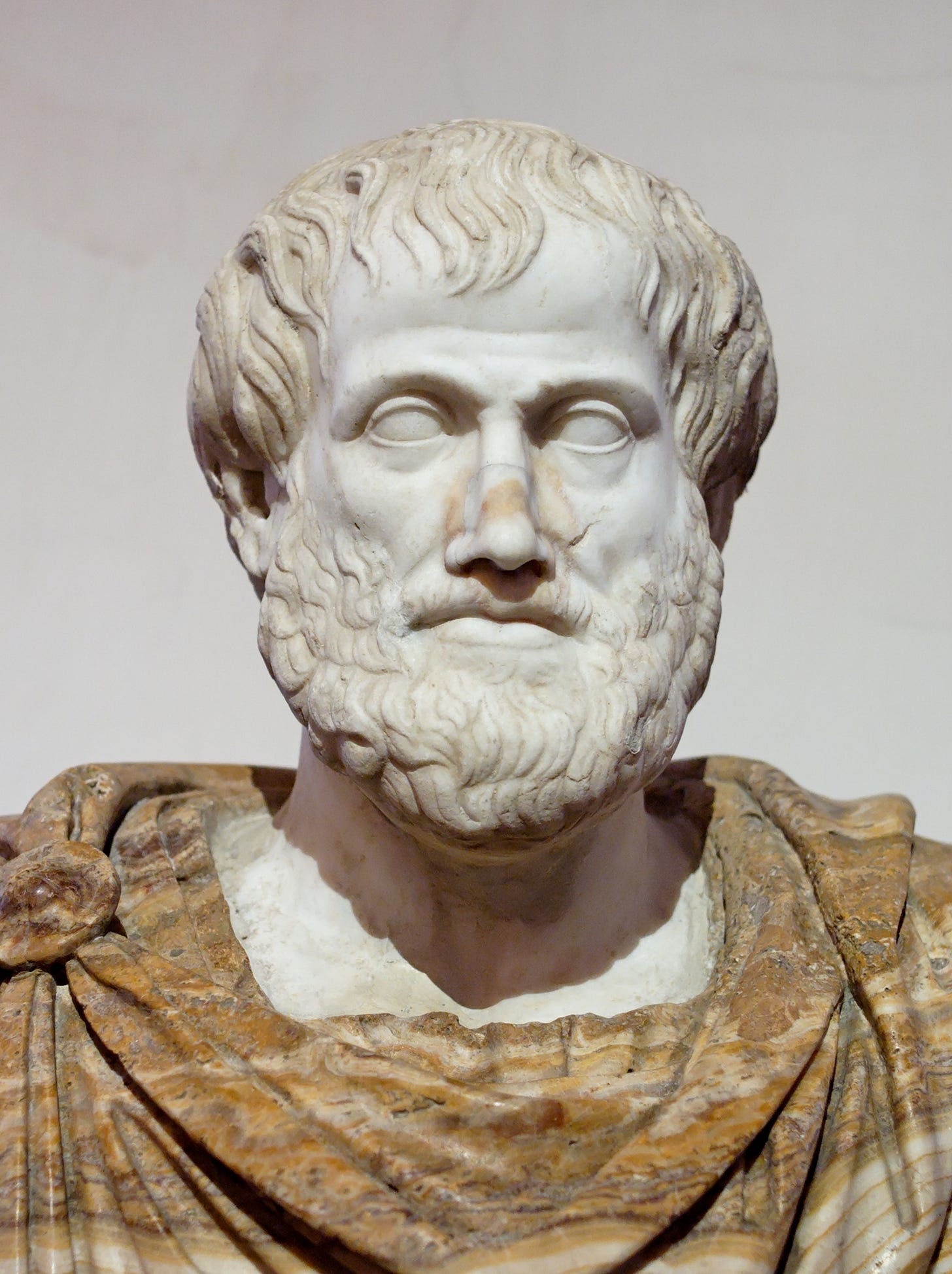Aristotle
Aristotle is remembered as one of the greatest philosophers in all history. A polymath, it appears like he knew everything there is to know about everything. Perhaps the choicest quote in that article to demonstrate just how admired he is, is the following:
Aristotle was revered among medieval Muslim scholars as “The First Teacher”, and among medieval Christians like Thomas Aquinas as simply “The Philosopher”, while the poet Dante called him “the master of those who know".
Also notably, instead of a list of persons influenced, the Influenced section in the sidebar says:
Virtually all subsequent Western philosophy, especially Aristotelianism e. g. Averroes, Aquinas. Also pre-Enlightenment science (see List of writers influenced by Aristotle)
He is mainly remembered for his writings, that is, his dead letters, which is a sign of the logomanic illness that has festered in the West since Plato, and which has by now reached the point of utmost dissolution. But that is, perhaps, a story for another day.
Alexander
Alexander the Great, meanwhile, is remembered for his own towering accomplishments, such as literally being undefeated in battle, and creating an empire that “stretched from the Adriatic Sea to the Indus River”:
Much can be said of Alexander’s achievements, but Wikipedia provides quite the pith summary:
He is often ranked among the most influential people in human history.
The Creation of a Golem
The Golem is a mythical Jewish creature, a being created from clay or mud by “those close to divinity”. In some stories, words are inscribed on the Golem to control it, notably in one case:
The golem could then be deactivated by removing the aleph (א) in emét, thus changing the inscription from “truth” to “death” (mét מת, meaning “dead”).
I say “notably”, because I like this divine truth, of “truth” being the opposite of “death” (where this leaves the atheists is left as a silly exercise for the reader). Anecdotally, I also recall seeing the Golem depicted as being fed a parchment with the relevant inscription, though I can’t quite find where I saw that.
Like all myths, the myth of the Golem points to the truth analogically. More intelligibly, Golems are real: they are us. We are born into a cultural context, where stories and notions are implanted deep into our subconscious from our earliest childhood, these stories forming the basis of what we think is ordinary, of what we call common sense.
But some men meet with a grander fate: they fall into the hands of a man “close to divinity”, who kneads them like clay, and if successful, creates something superhuman. This was the fate of Alexander the Great, the wonderful clockwork golden boy of Aristotle.
How is such a feat as the making of Alexander the Great accomplished? There are no formulas for this. From Wikipedia, we get:
Aristotle encouraged Alexander toward eastern conquest, and Aristotle’s own attitude towards Persia was unabashedly ethnocentric. In one famous example, he counsels Alexander to be “a leader to the Greeks and a despot to the barbarians, to look after the former as after friends and relatives, and to deal with the latter as with beasts or plants”.
and:
Aristotle taught Alexander and his companions about medicine, philosophy, morals, religion, logic, and art. Under Aristotle’s tutelage, Alexander developed a passion for the works of Homer, and in particular the Iliad; Aristotle gave him an annotated copy, which Alexander later carried on his campaigns. Alexander was able to quote Euripides from memory.
I might give an arm for a copy of the Iliad annotated by Aristotle. At any rate, how does such an education create an Alexander? Turns out there is a crucial piece missing in these accounts: the unwritten doctrines:
Plutarch describes Alexander as a brilliant student in his Parallel Lives; so high-performing that he is introduced to the acroamatic (“for hearing only”) and to the esoteric doctrines (“belonging to an inner circle”) - originally referred to the secret teachings of Greek philosophers-. Those two doctrines are the core of the Aristotelian philosophy and the highest knowledge precepts at that time.
The secret of how to summon Alexander appears lost, just as the secret of how to summon Aristotle in turn, and Plato and so on. A chain of transmission was broken, apparently by Aristotle, who was the end of the Socrates-Plato-Aristotle transmission (did that chain really begin in Socrates?). Perhaps because he was mistaken in making Alexander into a conqueror: he should have made him a philosopher. Alexander himself said:
I’d rather distinguish myself for my knowledge than for my fighting skills
Sounds like he should have been a Brahmin and not a Kshatriya. Shaman, not warrior-king. But it was not a waste, as we ultimately get him as a lodestar of human competence, as evidence that there can be such a thing as human superintelligence. Perhaps he is even a better exemplar of this than say, Von Neumann. Alexander the Great acquitted himself in the kiln of the battlefield, unlike Neumann, who had the luxury of taking his time. Could Neumann have replicated the Alexandrian conquests, in his shoes?
Ah, but this is starting to sound a bit like some fascist tract. I do not admire war. Perhaps in the time of Alexander, conquest was the only way that reaching the “ends of the world and the Great Outer Sea” could have possibly been achieved, but we fortunately do not live in such brutal times.
Regardless, this mysterious knowledge that birthed a Dragon must be retrieved. We are certainly in a time where there are plenty of Gordian Knots to unravel.
There is an X-Wing buried in the swamp of our unconscious, and it must be dredged up. I already retrieved mine. Can you retrieve yours?
If you want help with that, then like, share, and subscribe!





